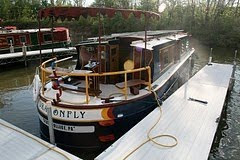 |
| Santa sells seafood by the seashore. Say it six times fast! |
We had rented a car--which is to say we gratefully paid $20 bucks to borrow the aging Ford Explorer usually reserved for the resort housekeeper to make her rounds in-- so we could do a spot of sightseeing. First stop: The Road to Nowhere.
This road, which cuts through pinewoods and coastal marshes, was a pork-barrel project decades ago--the narrow blacktop, void of yellow lines or shoulders or signs, literally dead ends in the middle of nowhere as a pile of rubble facing an expanse of marsh grass.
Though it's not a shortcut to Suwanee, some local constituents benefited from the road's construction: drug smugglers, who used it as a runway on which to set down in small planes and drop off "bales of square mullet." (Mullet being a popular local fish, which is generally consumed in the form of smoked mullet, mellowed over a wood fire. Double entendre doubtless intended.)
 |
| What does THAT mean? For the answer, check the SlowBoat Facebook page. |
The big bust in 1973 made national news. If you are of a certain age, maybe you remember the Steinhatchee Seven--seven local guys caught with nine tons of dope. The writer William Least Heat Moon tells the story well in his book Road to Quoz. (Click the link to read the chapter)
Traveling along the Road to Nowhere, we saw a pick-up parked on a bridge over a creek, the bed packed with dog crates. From the bridge, two guys were hurling casting nets. "Let's check out their technique!" the crew suggested to the Cap'n, who has taken up this local sport as a new hobby.
As they hauled in a net and dumped a mound of little silver fish on the asphalt, the guys amiably answered questions from that couple of yuppie Yankees in their fancy parkas.
"Castin' for mullet. Little ones. Use 'em as live bait to catch grouper." A whole school of the four-inch-long fish swarmed in a big green Coleman cooler.
Turns out, our casting-net guru? Sheriff Dave Turner (now retired) of neighboring Gilchrist County. He was part of the surveillance crew when the big bust went down. Small world, small town.
Next stop: Suwannee, which like Steinhatchee is a tiny coastal town in the middle of basically nowhere. On the drive there we marveled at the high-voltage wires lining the narrow road. Quite an expense to bring power to just a few people, we said. Towns like this would be the ideal place for small, alternative-energy projects that could make homes energy-independent. Go off the grid entirely. Hey, it's Florida! Plenty of sunshine! Solar panels would be perfect!
I was thinking about that this morning when I spotted this story in today's New York Times, about micro-solar installations in Africa. Though numbers are hard to come by, it seems rural folks in third world nations are increasingly turning to solar panels, now that they have become affordable, mostly because China is into manufacturing alternative energy technologies in a big way.
The situation is analogous to the recent ubiquitous spread of cell phones in developing nations. Cells let you skip a step; developing nations didn't need to make a big, expensive investment in infrastructure--centralized distribution, miles and miles of wires--to have all the societal benefits of phones.
 |
| Aha! At least one Steinhatchee resident is going solar! |
Now, cheap solar panels make it easy for people to charge their phones. You invest the price of a few month's worth of batteries--or the cost of a couple of trips to a city where you can plug in . . . and you reap free power basically forever.
One little ol' panel on the roof also makes enough power to run LED lights (JUST like the ones on our boat, which allow us to have light while we're anchored out without running down our batteries). Clean, inexpensive, reliable lighting makes life better--makes it easier for kids to do homework at night, and babies don't get burned by kerosene lamps.
This past fall, as we travelled down the Tennessee Valley, locking our way past hydropower dams, we read about the creation of the Tennessee Valley Authority in the 1930s--how the government aimed to make life better for farmers in this remote rural area by bringing them electrical power.
Of course, we're not naive. Rural electrification didn't magically solve all of society's problems. And the more power you have, the more you want. Most boaters don't merely want overhead lights on their boats when they out are at anchor. Most of the boaters we have talked to want a big fridge for their cold beer . . . . a couple of TVs . . . air conditioning. People in Africa and India and rural China . . . once they see these things, they want them too.
Still, we're beguiled to read that people aren't relying on big government to build the infrastructure to make their lives better. Just sell a goat and buy a solar panel. It's a beautiful thing.





Merry Christmas! From the Barbara Family and Bald Eagle Power Squadron!
ReplyDeleteThanks, Scott. Same to you and yours.
ReplyDeleteAnd this is a great chance to wish a very happy holiday season to everyone who's reading this blog. We really enjoy your support, feedback, and wit.